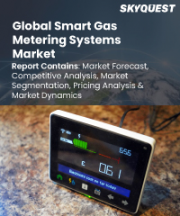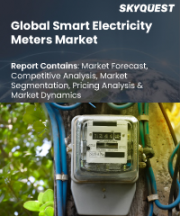
|
시장보고서
상품코드
1570877
주택용 AMI 가스 미터 시장, 기회, 성장 촉진요인, 산업 동향 분석과 예측(2024-2032년)Residential AMI Gas Meter Market, Opportunity, Growth Drivers, Industry Trend Analysis and Forecast, 2024-2032 |
||||||
세계의 주택용 AMI 가스 미터 시장은 2023년에 10억 달러로 평가되며, 2024-2032년 20.4% 이상의 CAGR로 성장할 것으로 예측됩니다.
이 성장의 원동력은 효율적인 에너지 관리와 정확한 청구 시스템에 대한 수요 증가이며, AMI 기술은 실시간 모니터링, 데이터 분석 및 원격 검침을 가능하게 하여 업무 효율성과 고객 참여를 향상시킵니다. 스마트 그리드 인프라를 촉진하는 정부 규제와 인센티브는 시장 확대를 더욱 촉진하고 있으며, RF, PLC, 셀룰러와 같은 통신 기술의 발전은 데이터 수집 및 전송 능력을 강화하여 시장 성장을 지원하고 있습니다. 에너지 절약과 스마트 미터의 이점에 대한 소비자의 인식이 높아진 것도 보급 확대에 기여하고 있습니다. 도시화 및 스마트 시티 구상은 공동주택 및 단독주택 부문에서 AMI 가스 미터 수요를 증가시켜 시장 확대의 강력한 기반이 되고 있습니다. 전반적으로 시장은 기술 발전, 규제 지원, 지속가능한 에너지 솔루션의 추구로 인해 강력한 성장을 이룰 준비가 되어 있습니다.
기술별로 보면 RF 기술 분야는 2032년까지 31억 달러 이상에 달할 것으로 예상되며, RF 기술은 셀룰러 및 PLC와 같은 다른 통신 기술에 비해 가격이 저렴한 경우가 많습니다. 상대적으로 저렴한 비용으로 인해 특히 가격에 민감한 시장에서 널리 채택되는 매력적인 선택이 되고 있으며, RF 기술은 AMI 시스템을 포함한 다양한 용도에서 광범위하게 사용되고 테스트되었습니다. 그 성숙도는 신뢰할 수 있는 성능과 낮은 기술 문제 발생 위험을 보장하여 많은 전력 회사들에게 선호되는 선택이 되고 있습니다.
최종사용자별로 보면 단독주택 부문은 2032년까지 20.3% 이상의 CAGR을 나타낼 것으로 예상됩니다. 특히 교외 및 반도시 지역에서 단독주택의 신축 및 개발이 증가하면서 고급 계측 솔루션에 대한 수요가 증가하고 있습니다. 더 많은 단독주택이 건설될수록 효율적이고 정확한 가스 측정 시스템의 필요성이 높아질 것입니다. 단독주택이 널리 보급된 교외 및 농촌 지역의 확장은 AMI 가스 미터에 대한 수요 증가에 기여하고 있습니다.
유럽의 주택용 AMI 가스 미터 시장은 2032년까지 12억 달러를 넘어설 것으로 예상됩니다. EU는 에너지 효율, 스마트 그리드 개발 및 에너지 효율 지침에 중점을 두고 있으며, 회원국 전체에 AMI 가스 미터를 포함한 스마트 계량기 도입을 의무화하고 있으며, EU는 에너지 관리 및 전력망 신뢰성을 높이기 위해 스마트 그리드 인프라에 많은 투자를 하고 있습니다. 에너지 관리 및 송전망의 신뢰성을 높이기 위해 스마트 그리드 인프라에 많은 투자를 하고 있으며, AMI 가스 미터 통합은 이러한 스마트 그리드 구상의 핵심 요소로 고급 데이터 수집 및 관리를 촉진하는 중요한 요소입니다.
목차
제1장 조사 방법과 조사 범위
제2장 개요
제3장 업계 인사이트
- 에코시스템 분석
- 벤더 매트릭스
- 규제 상황
- 업계에 대한 영향요인
- 촉진요인
- 업계의 잠재적 리스크 & 과제
- 잠재 성장력 분석
- Porter의 산업 분석
- PESTEL 분석
제4장 경쟁 구도
- 전략 대시보드
- 혁신과 지속가능성 전망
제5장 시장 규모·예측 : 기술별, 2021-2032년
- 주요 동향
- RF
- PLC
- 셀룰러
제6장 시장 규모·예측 : 최종사용자별, 2021-2032년
- 주요 동향
- 싱글 패밀리
- 멀티 패밀리
제7장 시장 규모·예측 : 지역별, 2021-2032년
- 주요 동향
- 북미
- 미국
- 캐나다
- 유럽
- 독일
- 영국
- 스웨덴
- 프랑스
- 이탈리아
- 아시아태평양
- 일본
- 중국
- 한국
- 인도
- 호주
- 중동 및 아프리카
- 아랍에미리트
- 사우디아라비아
- 남아프리카공화국
- 이집트
- 라틴아메리카
- 멕시코
- 브라질
- 아르헨티나
제8장 기업 개요
- Azbil Kimmon Co. Ltd.
- Aclara Technologies LLC
- AEM
- Chint Group
- Eaton Corporation
- Emerson
- Honeywell International, Inc.
- Holley Metering
- Itron, Inc.
- Landis+Gyr
- Osaki Electric Co., Ltd.
- Peltek India
- Schneider Electric SE
- Wasion Group
The Global Residential AMI Gas Meter Market was valued at USD 1 billion in 2023 and is projected to grow at a CAGR of over 20.4% from 2024 to 2032. This growth is driven by the increasing demand for efficient energy management and accurate billing systems. AMI technology enables real-time monitoring, data analytics, and remote meter reading, enhancing operational efficiency and customer engagement. Government regulations and incentives promoting smart grid infrastructure further drive market expansion. Advancements in communication technologies, such as RF, PLC, and cellular, enhance data collection and transmission capabilities, supporting market growth. Rising consumer awareness about energy conservation and the benefits of smart meters also contribute to increased adoption. Urbanization and smart city initiatives boost the demand for AMI gas meters in multi-family and single-family residential sectors, providing a strong foundation for market expansion. Overall, the market is poised for robust growth, driven by technological advancements, regulatory support, and the pursuit of sustainable energy solutions.
The overall residential AMI gas meter industry is classified based on the technology, end-user and region.
Based on technology, the RF technology segment is anticipated to cross USD 3.1 billion by 2032. RF technology is often more affordable compared to other communication technologies like cellular and PLC. Its relatively low cost makes it an attractive option for widespread adoption, particularly in price-sensitive markets. RF technology has been widely used and tested in various applications, including AMI systems. Its maturity ensures reliable performance and a lower risk of technical issues, making it a preferred choice for many utilities.
Based on end users, the single-family segment is anticipated to witness more than 20.3% CAGR through 2032. The rising growth in new single-family home construction and developments, particularly in suburban and semi-urban areas, drives the demand for advanced metering solutions. As more single-family homes are built, the need for efficient and accurate gas metering systems increases. The expansion of suburban and rural areas, where single-family homes are prevalent, contributes to the rising demand for AMI gas meters.
Europe's residential AMI gas meter market is projected to surpass USD 1.2 billion by 2032. European regulations and directives are driving the adoption of smart metering systems. The EU's focus on energy efficiency, smart grid development, and the Energy Efficiency Directive mandates the deployment of smart meters, including AMI gas meters, across member states. The European Union is investing heavily in smart grid infrastructure to enhance energy management and grid reliability. The integration of AMI gas meters is a crucial component of these smart grid initiatives, promoting advanced data collection and management.
Table of Contents
Chapter 1 Methodology and Scope
- 1.1 Market definitions
- 1.2 Base estimates and calculations
- 1.3 Forecast calculation
- 1.4 Data sources
- 1.4.1 Primary
- 1.4.2 Secondary
- 1.4.2.1 Paid
- 1.4.2.2 Public
Chapter 2 Executive Summary
- 2.1 Industry 360° synopsis, 2019 - 2032
Chapter 3 Industry Insights
- 3.1 Industry ecosystem analysis
- 3.1.1 Vendor matrix
- 3.2 Regulatory landscape
- 3.3 Industry impact forces
- 3.3.1 Growth drivers
- 3.3.2 Industry pitfalls and challenges
- 3.4 Growth potential analysis
- 3.5 Porter's analysis
- 3.5.1 Bargaining power of suppliers
- 3.5.2 Bargaining power of buyers
- 3.5.3 Threat of new entrants
- 3.5.4 Threat of substitutes
- 3.6 PESTEL analysis
Chapter 4 Competitive landscape, 2023
- 4.1 Strategic dashboard
- 4.2 Innovation and sustainability landscape
Chapter 5 Market Size and Forecast, By Technology, 2021 - 2032 (USD Million, '000 Units)
- 5.1 Key trends
- 5.2 RF
- 5.3 PLC
- 5.4 Cellular
Chapter 6 Market Size and Forecast, By End Users, 2021 - 2032 (USD Million, '000 Units)
- 6.1 Key trends
- 6.2 Single family
- 6.3 Multi family
Chapter 7 Market Size and Forecast, By Region, 2021 - 2032 (USD Million, '000 Units)
- 7.1 Key trends
- 7.2 North America
- 7.2.1 U.S.
- 7.2.2 Canada
- 7.2.3 Europe
- 7.2.4 Germany
- 7.2.5 UK
- 7.2.6 Sweden
- 7.2.7 France
- 7.2.8 Italy
- 7.3 Asia Pacific
- 7.3.1 Japan
- 7.3.2 China
- 7.3.3 South Korea
- 7.3.4 India
- 7.3.5 Australia
- 7.4 Middle East and Africa
- 7.4.1 UAE
- 7.4.2 Saudi Arabia
- 7.4.3 South Africa
- 7.4.4 Egypt
- 7.5 Latin America
- 7.5.1 Mexico
- 7.5.2 Brazil
- 7.5.3 Argentina
Chapter 8 Company Profiles
- 8.1 Azbil Kimmon Co. Ltd.
- 8.2 Aclara Technologies LLC
- 8.3 AEM
- 8.4 Chint Group
- 8.5 Eaton Corporation
- 8.6 Emerson
- 8.7 Honeywell International, Inc.
- 8.8 Holley Metering
- 8.9 Itron, Inc.
- 8.10 Landis+Gyr
- 8.11 Osaki Electric Co., Ltd.
- 8.12 Peltek India
- 8.13 Schneider Electric SE
- 8.14 Wasion Group



















